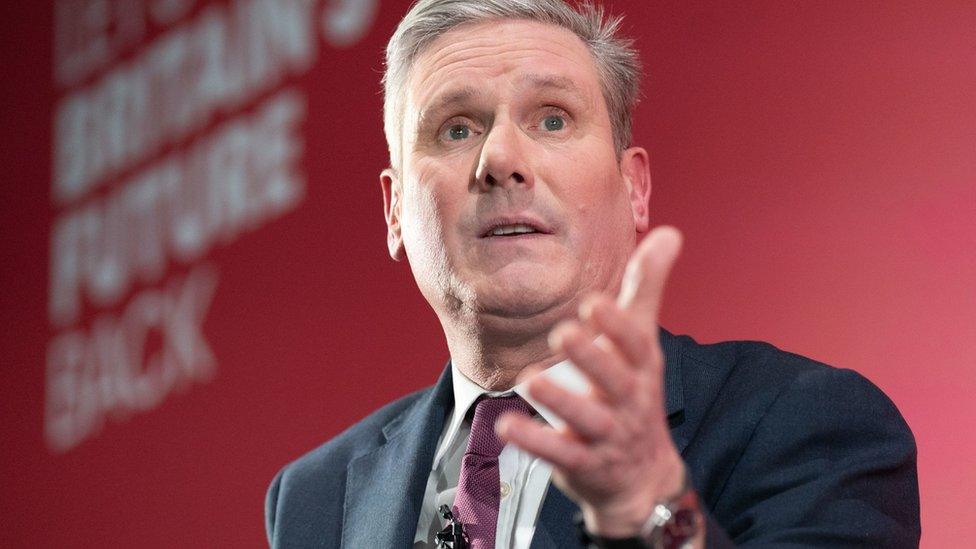Labour targets Tories over 'ambition' to scrap National Insurance
- Published
- comments

Labour believes it has found a new dividing line with the Conservatives at the next general election - National Insurance.
Both the Labour leader Sir Keir Starmer and the shadow work and pensions secretary Liz Kendall road-tested it today, when they denounced the Conservatives' long-term aim of abolishing National Insurance Contributions.
The party did not oppose new cuts to National Insurance in last week's Budget.
But the Labour leadership believes they have found a way to turn the tables on the Conservatives when it comes to economic competence.
Labour is still licking its wounds over its £28bn green prosperity plan - a pledge that was diluted last month under sustained attack over how it would be funded.
So, Labour has been quick to attach a price tag - a whopping £46bn - to the Conservatives' "ambition" to do away with National Insurance.
This was branded by Sir Keir as an "unfunded pledge".
This is despite Chancellor Jeremy Hunt making clear it would only happen when fiscal and economic conditions allow - and that it could not happen overnight.
But as Liz Kendall put it in a speech - ostensibly about pensions - on Wednesday morning: "If Labour made a commitment 100 times smaller than this we would rightly be asked to spell out - where is the money coming from?"
"Will it be paid for by higher borrowing? Or spending cuts to vital public services?"
At PMQs, Sir Keir suggested it would come at the expense of health expenditure or pensions.
Challenging the prime minister in the Commons, he said that 80% of National Insurance is spent on social security and pensions, and 20% on the NHS.
So, if pensions or NHS were not to be cut, the government would have to raise other taxes or borrow money.
Soon after, Labour released a dossier claiming that a "pensions bombshell" was in the offing - echoing the successful Conservative warning of a Labour "tax bombshell" at the 1992 election.
What is driving all this is not just a desire for revenge over the beaten and battered £28bn green investment pledge.
Labour held post-Budget focus groups last weekend, and they found that those questions resonated with key voters.
Certainly, national insurance contributions can determine how much state pension you qualify for.
So if National Insurance were to go, there was a worry amongst these voters about how pensions would be paid for - a concern Labour has been keen to amplify.
But on health spending, previous attempts to 'hypothecate' - or earmark - NICs for specific public services have been abandoned.
For example, the health and social care levy on National Insurance - proposed by Rishi Sunak as Chancellor - was scrapped by Liz Truss and never re-introduced.
So worries about National Insurance cuts being linked to NHS cuts are misplaced.
Jeremy Hunt has accused Labour of "scaremongering" and has said on X: "The value of NICs receipts do not determine the NHS budget, or the value of pensions."
And appearing before the Commons Treasury Committee, the chancellor said complete abolition would not happen in the next Parliament.
He stressed it was "a long-term ambition" of the Conservatives.
And the Treasury has added that this won't be done in a way which would harm pensioners, compromise public services or increase taxation of workers.
Nonetheless, confusion and concern over the government's intentions aren't necessarily unhelpful for Labour.
Party for pensioners?
Liz Kendall has declared Labour is now the party for pensioners.
That claim may be a little premature.
But it is certainly Labour's aim to peel pensioners away from the Conservatives - more than 60% of over-65s backed the Tories in 2019 - and whether by post or at a polling station, they are more likely to cast their ballot than younger people.
Some recent polls have suggested there is now a much narrower gap between the parties, in part due to some previous Conservative voters peeling off to Reform.
Labour are going to point out that cuts to NICs, unlike income tax reductions or higher tax thresholds, don't benefit pensioners.
And Labour will stick to the government's triple lock on pensions - ensuring the state pension rises with the highest of three measures: inflation, earnings, or 2.5%.
So there will be a political dividing line on NICs at the next election.
But it isn't pre-determined that the government loses the argument.
Chancellor Jeremy Hunt has at least set out a trajectory for lower NICs.
These reductions are cheaper than income tax cuts.
But he has also argued that it is right to target reductions at those who are in work rather than retired - as this is an incentive to get 50 and 60-somethings back in to the workforce.
That in turn could help boost the nation's income and productivity.
And in the Commons at PMQs, Mr Sunak took Labour's attack on the NICs policy as an admission that a Starmer government wouldn't cut the tax burden.
But some Conservative MPs believe people neither understand nor give the government credit for changes in NICs - unlike a cut in headline income tax rates.
So Labour hopes that Conservative concerns and voters' confusion could pay them political dividends.